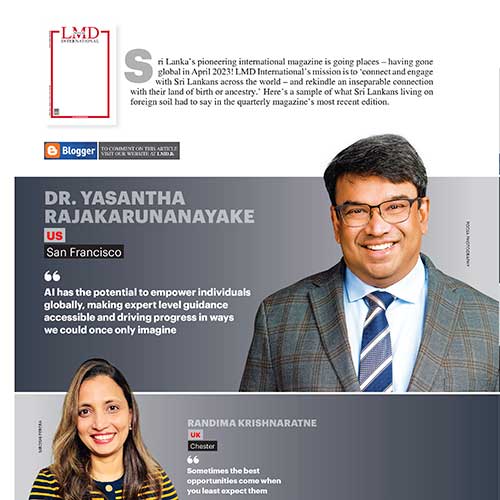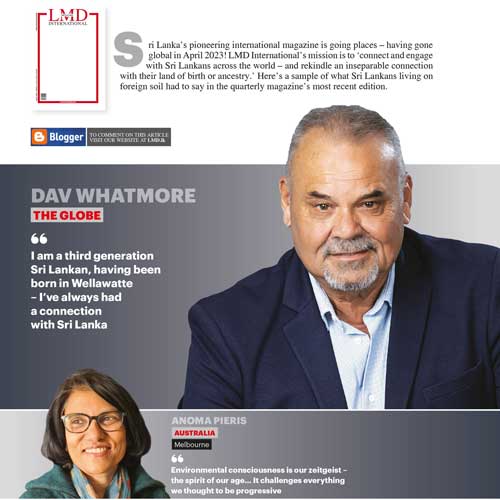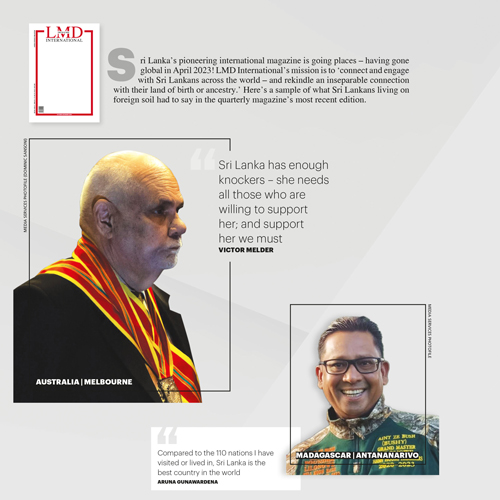SRI LANKANS OVERSEAS
OVERCOMING ADVERSITY
The post-COVID national rebuilding phase – Malinda Thotiwilage
Q: As far as perceptions go, do you think Sri Lanka is capable of regaining its composure in the aftermath of the COVID-19 pandemic?
A: The country remains in the midst of the pandemic – in fact, the whole world is. However, there are a number of possible futures, depending on how governments and society respond to the coronavirus and its economic aftermath.
Hopefully, the whole nation will use this crisis to rebuild, produce something better and be more humane. There needs to be transparency and honesty. But it’s possible that Sri Lanka will come out strong.
Q: How do you perceive Sri Lanka today?
A: Sri Lanka is a beautiful and very unique place! I always feel proud of where I come from. Unfortunately, Sri Lanka lacks credibility within the international community. The country’s image is compromised by a disconnect between the stated positions of elected officials and the reality of how power is exercised.
Q: And how do your compatriots in the UK view Sri Lanka?
A: There was a reason why Lonely Planet said the best place to visit in 2019 was Sri Lanka. Thanks to James Taylor who introduced tea planting to Sri Lanka, Brits remain a nation of loyal tea drinkers.
With Sri Lanka being so close to the equator, you would be guaranteed to experience the perfect setting sun. People in the UK associate Sri Lanka with being a place you can come back from with a suitcase load of happy memories and a couple of handmade boxes of Ceylon’s finest tea.
Q: Likewise, how do other Sri Lankans living in the UK view Sri Lanka?
A: I can’t speak for all Sri Lankans who live in the UK. Many people have left Sri Lanka to seek economic opportunities. Others migrate to be with family members who have emigrated or because of political conditions in Sri Lanka. Education is another reason for international migration as students pursue higher studies abroad.
One common factor for Sri Lankans here is that they love going back to Sri Lanka to enjoy the food and luxury hospitality the country offers.
Q: What were your impressions of Sri Lanka on your last visit and how much has it changed from the past?
A: I was last in Colombo in March at the beginning of the pandemic. I usually visit every year or two. In my opinion, the real change depends on citizens’ mindsets, which need a tune-up. Overall, the country has made some positive changes but at a snail’s pace.
Q: From afar, how do you perceive news about Sri Lanka and what mediums do you rely on to stay connected during times of crisis?
A: Although I’ve been living away from my country of birth for the last 13 years, I always find time to speak to my parents, siblings and close friends. Fortunately for them, I’m updated with recent versions of events that are slightly more factual than portrayed in the news.
Additionally, social media has made it easy to stay connected with the country’s current affairs.
Q: How do you view the brain drain and why is there still no reversal of it, in your opinion?
A: My wife being from the UK meant having to move to London and starting a family was the direction, and we took to staying here. Ultimately, this also improved my job prospects and living abroad has revolutionised my career.
There are advantages to living abroad; the quality of life, higher salaries, access to advanced technologies, greater opportunities and more stable political conditions will certainly attract talent from developing countries such as Sri Lanka.
A reversal of the brain drain is unlikely as the younger generation will always seek to educate themselves abroad. The present social, political and economic conditions too mean this is very unlikely.
Q: What should Sri Lanka focus on most in the coming decade?
A: The government should invest in new ideas on how to hold a strong political position. It shouldn’t get involved in international conflicts and must build relationships with world power hubs.
Strengthening the country’s democracy is also a key to success, which ensures freedom of speech and expression to citizens.
Q: And what are your hopes for the country in the next decade or so?
A: The tourism industry will make an important contribution to the country’s development. Therefore, infrastructure, rapid transformation systems and upgraded cities will hopefully create more opportunities for citizens.











